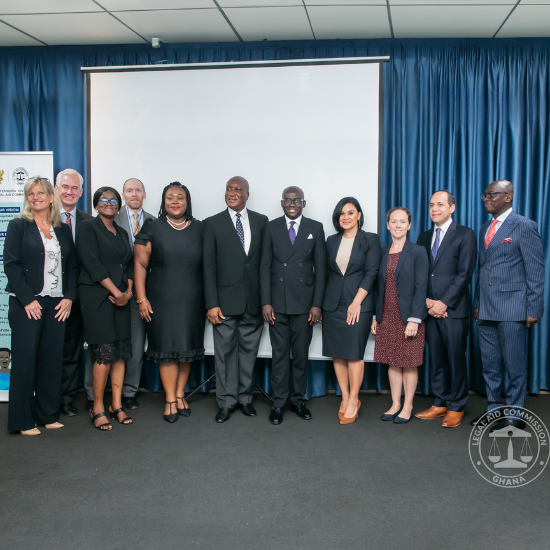Sudreau Global Justice Institute Helps to Establish New Public Defenders’ Division in Ghana
Sudreau Global Justice Institute Helps to Establish New Public ... Pepperdine University Newsroom


Pepperdine’s Sudreau Global Justice Institute Assists Ghana in Establishing Public Defenders’ Division

Public defenders, attorneys provided by the government without charge to criminal defendants, and plea bargaining, the ability of defendants to relinquish their right to go to trial in exchange for a perceived benefit such as a reduced sentence, are foundational to the US criminal justice system. But until recently, neither existed in the West African nation of Ghana. Among other unfortunate and sometimes devastating outcomes, these systemic issues created a significant backlog of cases in the criminal courts system, with many of the accused, especially the poor, spending months or even years in prison before having the opportunity to defend themselves at trial—usually without the assistance of a lawyer.
Addressing Injustices and Establishing the Public Defenders’ Division
To address these injustices, Pepperdine’s Sudreau Global Justice Institute (SGJI), an international human rights organization based out of the Caruso School of Law, has successfully assisted the Ghanaian government to establish its first Public Defenders’ Division (PDD) as part of its criminal justice system. SGJI is funded through an $8 million endowment from Caruso Law alumna Laure Sudreau (JD ’97). Its mission is to strengthen justice systems, defend the defenseless, and train the next generation of law students to advocate on behalf of those in need.
“Reducing excessive pretrial detention is a primary focus of SGJI and is seen as one of the leading justice issues on the African continent by the United Nations and the US Department of Justice’s Office of Overseas Prosecutorial Development, Assistance, and Training (OPDAT),” says Alan Collier (JD ’90), SGJI’s director of West Africa since 2019. “In order for plea bargaining to work as a tool in reducing excessive pretrial detention, there was a need to create a public defender system in Ghana to support representation of the indigent.”
A worldwide movement to introduce plea-bargaining options in nations that do not currently offer them is currently underway, and the concurrent establishment of public defense programs is necessary for plea bargaining to work most productively.
“Without a lawyer, most defendants wouldn’t know how to plead effectively,” says Collier. “When lawyers from both sides take a look at the evidence, many cases are dismissed. And there’s also an option for restorative justice, where the victim is allowed to speak in court. Sometimes what the victim wants is an apology from the person who did them wrong. Sometimes the defendant is required to pay restitution. So this process can be beneficial to crime victims as well as defendants. Plea bargaining is like alternative dispute resolution in the criminal justice context.”
The Journey to Establishing the Public Defenders’ Division
While Ghana has had a formal legal aid scheme since 1987, it had not focused primarily on criminal defense, according to Collier. In 2018, the Ghanaian Parliament established a formal Legal Aid Commission (LAC) through the Legal Aid Commission Act, which called for the creation of the PDD, but getting such a complicated program off the ground proved to be an enormous undertaking.
SGJI’s work in Ghana began in the summer of 2019 when the Supreme Court of Ghana brought in two Pepperdine law students to act as legal interns and asked SGJI to assist the government in developing its plea-bargaining system. Collier moved to the capital city of Accra in September 2019 to establish SGJI’s physical presence in Ghana.
In November 2020, Collier began a partnership, based on SGJI’s and the US Department of Justice’s common interest in promoting plea bargaining and public defense, with William “Bill” Houser, the resident legal advisor at the US Embassy in Ghana.
“We met with the newly appointed chief justice, Anin Yeboah, and chair of the Legal Aid Board, Justice Nene Amegatcher, to ask whether we could help lead an effort to establish the PDD in Ghana,” says Collier, a meeting that resulted in the creation of the Public Defense Steering Committee. Collier and Houser also teamed up with OPDAT to train all lawyers working for the LAC in matters of criminal defense. Due to the importance and scope of the project, OPDAT later commissioned a second legal advisor, Paul Gill—a 20-year US federal public defender—to work with Collier and Houser to implement the official launch of the PDD.
Successes and Future Plans
“Through the combined work of the LAC, OPDAT, and SGJI, 38 out of 54 legal aid lawyers became public defenders exclusively working on criminal matters,” says Collier. “The handling of criminal cases rose by 40 percent the first year and 50 percent the second year. And those percentages are steadily increasing.”
Collier considers this work to be part of Pepperdine’s mission as a Christian university. “People might ask why we want to help people who are in prison,” says Collier. “It’s like working with any disenfranchised population that gets dehumanized. Jesus said, ‘I was in prison and you visited me.’ People in prison deserve to have a voice, and poverty should not be a crime. Many of those we find incarcerated are merely there because they are poor, and no one has ever spoken to them or looked into their cases, many of which are unfounded or false. Public defense is a step forward in battling the issue of unjust incarceration.”
Working with OPDAT, the US State Department’s Bureau of International Narcotics and Law Enforcement Affairs, the Ghanaian Attorney General’s Office, and local nongovernmental organizations, plea-bargaining legislation was successfully passed in Ghana in July 2022, and the PDD was launched on May 10, 2023. The US government was represented at the PDD’s official launch event (pictured above) by Caruso Law alumna Rachel Rossi (JD ’09), director of the US Department of Justice’s Office for Access to Justice, who delivered an address about the importance of the role of public defenders in protecting human rights, defending the rule of law, and upholding the integrity of justice systems.
Successes like these are the inspiration for SGJI’s continuing efforts to help Ghana improve its criminal justice system. “We want the PDD to lead the way in the implementation of plea bargaining as a tool to fight
SDGs, Targets, and Indicators
| SDGs | Targets | Indicators |
|---|---|---|
| SDG 16: Peace, Justice, and Strong Institutions | Target 16.3: Promote the rule of law at the national and international levels and ensure equal access to justice for all | Indicator 16.3.2: Unsentenced detainees as a proportion of overall prison population |
| SDG 16: Peace, Justice, and Strong Institutions | Target 16.6: Develop effective, accountable, and transparent institutions at all levels | Indicator 16.6.1: Primary government expenditures as a proportion of original approved budget, by sector (or by budget codes or similar) |
| SDG 5: Gender Equality | Target 5.1: End all forms of discrimination against all women and girls everywhere | Indicator 5.1.1: Whether or not legal frameworks are in place to promote, enforce and monitor equality and non-discrimination on the basis of sex |
| SDG 10: Reduced Inequalities | Target 10.2: By 2030, empower and promote the social, economic and political inclusion of all, irrespective of age, sex, disability, race, ethnicity, origin, religion or economic or other status | Indicator 10.2.1: Proportion of people living below 50 percent of median income, by sex, age, and persons with disabilities |
1. Which SDGs are addressed or connected to the issues highlighted in the article?
SDG 16: Peace, Justice, and Strong Institutions
The article discusses the establishment of Ghana’s first Public Defenders’ Division (PDD) to address systemic issues in the criminal justice system. This aligns with SDG 16, which aims to promote peace, justice, and strong institutions.
SDG 5: Gender Equality
The article mentions the importance of legal frameworks to promote and enforce equality and non-discrimination on the basis of sex. This relates to SDG 5, which focuses on achieving gender equality and empowering women and girls.
SDG 10: Reduced Inequalities
The article highlights the issue of unjust incarceration, particularly affecting the poor. This connects to SDG 10, which aims to reduce inequalities and promote social, economic, and political inclusion for all individuals.
2. What specific targets under those SDGs can be identified based on the article’s content?
Target 16.3: Promote the rule of law at the national and international levels and ensure equal access to justice for all
The establishment of Ghana’s Public Defenders’ Division (PDD) contributes to promoting the rule of law and ensuring equal access to justice for all individuals.
Target 16.6: Develop effective, accountable, and transparent institutions at all levels
The article discusses the collaboration between Pepperdine’s Sudreau Global Justice Institute (SGJI), the Ghanaian government, and other organizations to establish the PDD. This demonstrates efforts to develop effective, accountable, and transparent institutions in Ghana’s criminal justice system.
Target 5.1: End all forms of discrimination against all women and girls everywhere
The article mentions the importance of legal frameworks to promote and enforce equality and non-discrimination on the basis of sex. This aligns with the target of ending all forms of discrimination against women and girls.
Target 10.2: By 2030, empower and promote the social, economic and political inclusion of all, irrespective of age, sex, disability, race, ethnicity, origin, religion or economic or other status
The article highlights the issue of unjust incarceration, particularly affecting the poor. Addressing this issue and promoting equal access to justice contributes to the target of empowering and promoting the social, economic, and political inclusion of all individuals.
3. Are there any indicators mentioned or implied in the article that can be used to measure progress towards the identified targets?
The article does not explicitly mention specific indicators to measure progress towards the identified targets. However, some indicators that can be relevant based on the article’s content are:
Indicator 16.3.2: Unsentenced detainees as a proportion of overall prison population
This indicator can measure progress towards Target 16.3 by assessing the proportion of unsentenced detainees in Ghana’s prison population. The establishment of the PDD and improvements in the criminal justice system may lead to a reduction in unsentenced detainees.
Indicator 16.6.1: Primary government expenditures as a proportion of original approved budget, by sector (or by budget codes or similar)
This indicator can assess progress towards Target 16.6 by examining the proportion of primary government expenditures allocated to the criminal justice sector. Increased investments in the criminal justice system, including the establishment of the PDD, can indicate efforts to develop effective and accountable institutions.
Indicator 5.1.1: Whether or not legal frameworks are in place to promote, enforce and monitor equality and non-discrimination on the basis of sex
This indicator can measure progress towards Target 5.1 by evaluating the presence of legal frameworks in Ghana that promote and enforce equality and non-discrimination on the basis of sex. The establishment of the PDD and efforts to address gender disparities in the criminal justice system can contribute to achieving this indicator.
Indicator 10.2.1: Proportion of people living below 50 percent of median income, by sex, age, and persons with disabilities
This indicator can assess progress towards Target 10.2 by examining the proportion of individuals living below 50 percent of the median income, considering factors such as sex, age, and disability. Addressing unjust incarceration and promoting equal access to justice can contribute to reducing inequalities and improving the economic well-being of marginalized individuals.
4. Table: SDGs, Targets, and Indicators
| SDGs | Targets | Indicators |
|---|---|---|
| SDG 16: Peace, Justice, and Strong Institutions | Target 16.3: Promote the rule of law at the national and
Behold! This splendid article springs forth from the wellspring of knowledge, shaped by a wondrous proprietary AI technology that delved into a vast ocean of data, illuminating the path towards the Sustainable Development Goals. Remember that all rights are reserved by SDG Investors LLC, empowering us to champion progress together. Source: pepperdine.edu
Join us, as fellow seekers of change, on a transformative journey at https://sdgtalks.ai/welcome, where you can become a member and actively contribute to shaping a brighter future.
|








